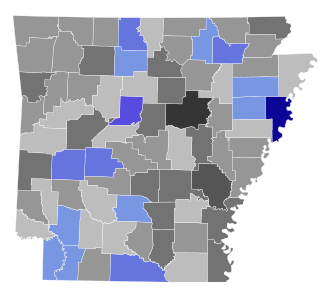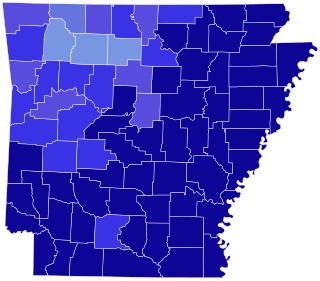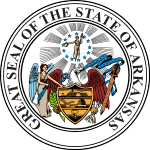
Homer Martin Adkins was an American businessman and Democratic politician who served as the 32nd Governor of Arkansas. Adkins is remembered as a skilled retail politician and a strong states' rights proponent and social conservative who served as governor during a period when Arkansas departed from several national economic and societal trends. The Adkins administration fought federal influence in Arkansas during the post-New Deal era; successfully courting federal wartime production investment, during World War II, while battling the federal resettlement of Japanese-Americans in the state and Supreme Court civil rights decisions.
Southern Democrats are affiliates of the U.S. Democratic Party who reside in the Southern United States. Most of them voted against the Civil Rights Act of 1964 by holding the longest filibuster in American Senate history while Democrats in non-Southern states supported the Civil Rights Act of 1964. After 1994 the Republicans typically won most elections in the South.

Elections in Georgia are held to fill various state and federal seats. Georgia regular elections are held every even year. The positions being decided each year varies, as the terms of office varies. The State Senate, State House and U.S. House will typically be up for election, as all of those positions have two-year terms. Special elections are held to fill vacated offices. Georgia is one of seven states that require a run-off election if no candidate receives a majority of the vote in a primary election. Uniquely, Georgia requires a run-off election for state and congressional offices if no candidate wins a majority of the vote in a general election; only Louisiana has a similar requirement, but it operates under a different election system.

The 2006 Illinois elections were held on November 7, 2006. On that date, registered voters in the State of Illinois elected officeholders for U.S. Congress, to six statewide offices, as well as to the Illinois Senate and Illinois House.

Arkansas's 2006 state elections were held November 7, 2006. Primaries were held May 23 and runoffs, if necessary, were held June 13. Arkansas elected seven constitutional officers, 17 of 35 state senate seats, all 100 house seats and 28 district prosecuting attorneys, and voted on one constitutional amendment and one referred question. Non-partisan judicial elections were held the same day as the party primaries for four Supreme Court justices, four appeals circuit court judges, and eight district court judges.

The 2012 United States elections took place on November 6, 2012. Democratic President Barack Obama won reelection to a second term and the Democrats gained seats in both chambers of Congress, retaining control of the Senate even though the Republican Party retained control of the House of Representatives. As of 2022, this is the most recent election cycle in which neither the presidency nor a chamber of Congress changed partisan control, and the last time that the winner of the presidential race provided coattails for their party in both the House of Representatives and the Senate.

Arkansas's 2010 general elections were held November 2, 2010. Primaries were held May 18, 2010 and runoffs, if necessary, were held November 23, 2010. Arkansas elected seven constitutional officers, 17 of 35 state senate seats, all 100 house seats and 28 district prosecuting attorneys, and voted on one constitutional amendment and one referred question. Non-partisan judicial elections were held the same day as the party primaries for four Supreme Court justices, four appeals circuit court judges, and eight district court judges.

Elections were held in Illinois on Tuesday, November 2, 2010. Primary elections were held on February 2, 2010.
The State government of Arkansas is divided into three branches: executive, legislative and judicial. These consist of the state governor's office, a bicameral state legislature known as the Arkansas General Assembly, and a state court system. The Arkansas Constitution delineates the structure and function of the state government. Since 1963, Arkansas has had four seats in the U.S. House of Representatives. Like all other states, it has two seats in the U.S. Senate.

The 1937 Arkansas special senatorial election was held on October 19, 1937, following the death of longtime Democratic senator Joe T. Robinson. Robinson was a powerful senator, staunch Democrat, and strong supporter of Franklin D. Roosevelt, and was instrumental in passing many New Deal programs through the Senate. Arkansas was essentially a one-party state during the Solid South period; the Democratic Party controlled all aspects of state and local office. Recently elected Democratic Governor of Arkansas Carl E. Bailey initially considered appointing himself to finish Robinson's term, but later acceded to a nomination process by the Democratic Central Committee, avoiding a public primary but breaking a campaign process. Avoiding the primary so angered the public and establishment Democrats, leading them to coalesce behind longtime Democrat John E. Miller as an independent, forcing a general election.

The 1932 Arkansas gubernatorial election was held on November 8, 1932, to elect the Governor of Arkansas, concurrently with the election to Arkansas's Class III U.S. Senate seat, as well as other elections to the United States Senate in other states and elections to the United States House of Representatives and various state and local elections.

Arkansas held a general election on November 8, 1932. At the top of the ticket, Franklin D. Roosevelt won the state handily in his successful bid to become the 32nd President of the United States. Arkansans elected Hattie Caraway to the United States Senate, the first woman elected to a full term in history. For the United States House of Representatives, Bill Cravens, a former Representative from 1907 to 1913, returned to politics and defeated a wide field in the Arkansas 4th. Tilman Parks defeated several challengers to retain the Arkansas 7th. All of Arkansas's statewide constitutional offices were up for reelection, including governor. Incumbent Harvey Parnell declined to run for reelection, and was supplanted by Junius Marion Futrell.

Elections were held in Illinois on Tuesday, November 8, 1994. Primaries were held on March 15, 1994.

Elections were held in Illinois on Tuesday, November 6, 1990. Primaries were held on March 20, 1990.

Elections were held in Illinois on Tuesday, November 7, 1978.

Elections were held in Illinois on Tuesday, November 4, 1952.

Elections were held in Illinois on Tuesday, November 6, 1956.

Elections were held in Illinois on Tuesday, November 3, 1936.
The 1944 Massachusetts general election was held on November 7, 1944, throughout Massachusetts. Primary elections took place on July 11.

Arkansas held a general election on November 6, 1934. Held during a midterm year, the state did not vote for President or Senate in 1934. For the United States House of Representatives, each of Arkansas's seven Representatives sought re-election. Only David Delano Glover in the Arkansas 6th was challenged in the Democratic primary, he was defeated by John McClellan. Claude A. Fuller and Tilman B. Parks handily defeated Republican and Independent challengers for the Arkansas 3rd and Arkansas 7th, respectively.








